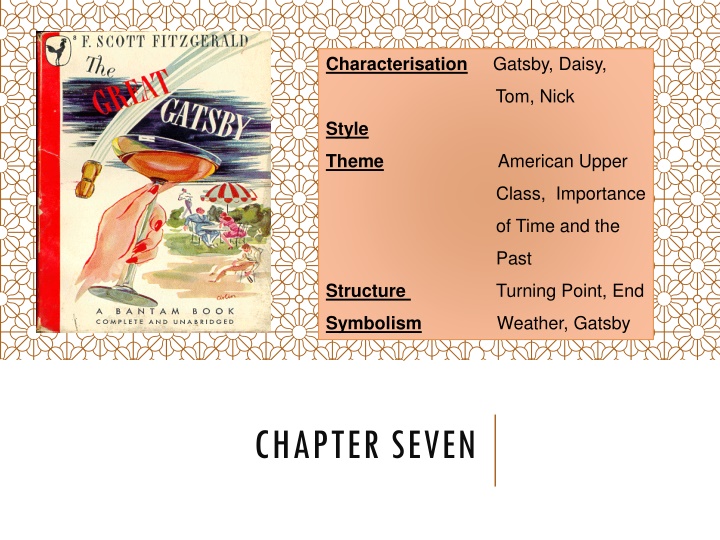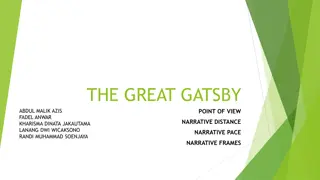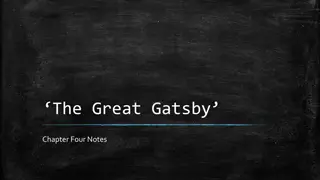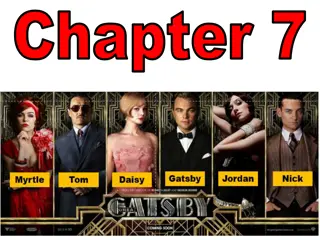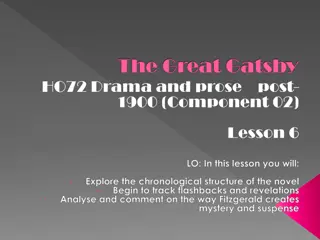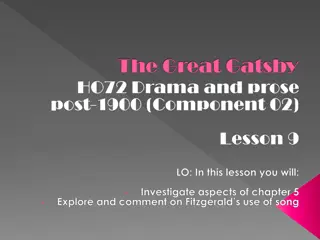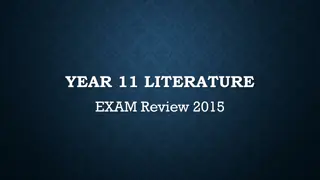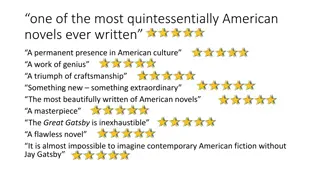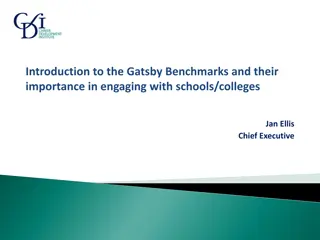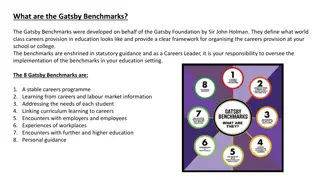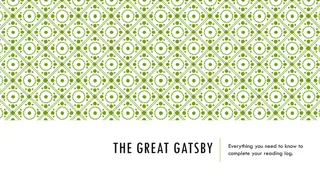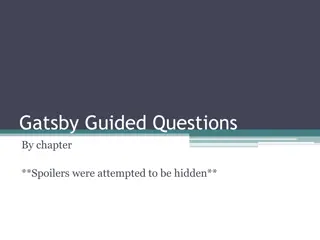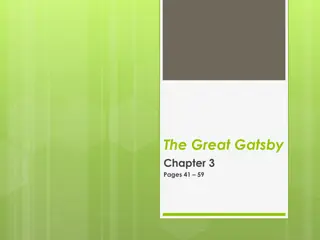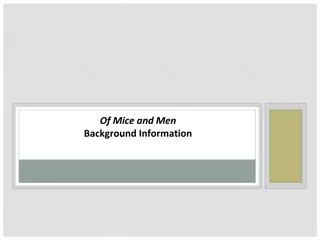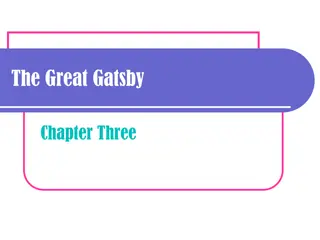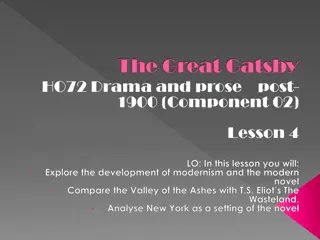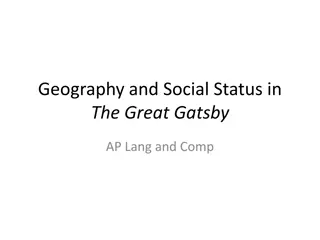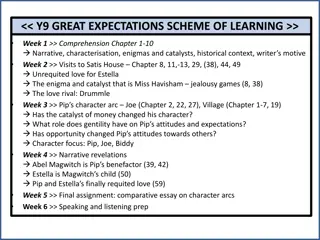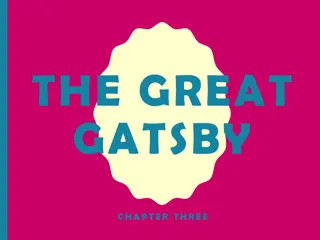Analysis of Characterisation and Themes in Chapter Seven of "The Great Gatsby
In Chapter Seven of "The Great Gatsby," the characterisation of Gatsby, Daisy, Tom, and Nick deepens, revealing their complexities and motivations. Themes of the American upper class, the importance of time and the past, and the symbolism of weather come to the forefront. Gatsby's association with a vulgar social upstart like Trimalchio and his questionable relationships raise doubts about his character. The chapter also exposes Gatsby's illegally acquired fortune and his singular focus on Daisy. Nick's reliability as a narrator is called into question, adding layers of intrigue to the narrative.
Download Presentation

Please find below an Image/Link to download the presentation.
The content on the website is provided AS IS for your information and personal use only. It may not be sold, licensed, or shared on other websites without obtaining consent from the author.If you encounter any issues during the download, it is possible that the publisher has removed the file from their server.
You are allowed to download the files provided on this website for personal or commercial use, subject to the condition that they are used lawfully. All files are the property of their respective owners.
The content on the website is provided AS IS for your information and personal use only. It may not be sold, licensed, or shared on other websites without obtaining consent from the author.
E N D
Presentation Transcript
Characterisation Gatsby, Daisy, Tom, Nick Style Theme American Upper Class, Importance of Time and the Past Turning Point, End Structure Symbolism Weather, Gatsby CHAPTER SEVEN
CHARACTERISATION - GATSBY His career as Trimalchio was over Trimalchio was a vulgar social upstart, therefore this description has negative connotations Task Discuss why the description of a vulgar upstart might be an appropriate one for Gatsby.
CHARACTERISATION - GATSBY They re some people Wolfshiem wanted to do something for - this again adds doubt in our minds about Gatsby s judgement and wisdom. Wolfshiem is a shady character. What does it suggest about Gatsby that he is prepared to surround himself by people like this?
CHARACTERISATION - GATSBY It is in this chapter that Gatsby s fortune is revealed as illegally acquired - I found out what your drug stores were. He turned to us and spoke rapidly. He and this Wolfshiem bought up a lot of side-street drug- stores here and in Chicago and sold grain alcohol over the counter...I picked him for a bootlegger the first time I saw him.
CHARACTERISATION - GATSBY He spoke as if Daisy s reaction was the only thing that mattered Again, this conveys another negative aspect to Gatsby s characterisation. He is only worried about Daisy. Of course I ll say I was shows how much he is in love with Daisy. He is prepared to take the blame for Myrtle s death
CHARACTERISATION - NICK Again this chapter calls into question Nick s reliability as a narrator. Discuss the way in which the following quote is significant in arousing the reader s suspicions regarding his reliability: I had one of those renewals of complete faith in him that I d experienced before
CHARACTERISATION - DAISY This chapter again conveys reinforces our impression of her being non- maternal Discuss the way in which the following quote reveals this:- The child, relinquished by the nurse, rushed across the room and rooted shyly into her mother s dress
CHARACTERISATION - DAISY Consider the following quote. In what way does it convey negative connotations regarding Daisy s characterisation:- That s because your mother wanted to show you off
CHARACTERISATION - DAISY That s because your mother wanted to show you off Daisy sat back upon the couch. The nurse took a step forward and held out her hand.... Good-bye, sweetheart! Her daughter s reluctant backward glance suggests she would like to stay with her mother. However, Daisy simply dismisses her and does not even refer to her by her name. This again adds to our negative impression of Daisy.
CHARACTERISATION - DAISY Her voice is full of money, he said suddenly Gatsby s description of Daisy again adds to our negative connotations. This description once again suggests a materialistic nature and a lack of emotion and spirit she is meretricious/vacuous/lacks vision. Daisy s negative portrayal continues when Gatsby s past is revealed: With every word she was drawing further and further into herself It is further reinforced at the end of the chapter- I walked away and left him standing there in the moonlight watching over nothing Daisy has chosen to ignore the fact that Gatsby is prepared to take the blame for Myrtle s death and has decided to stay with Tom
CHARACTERISATION - DAISY Task Brainstorm the reasons why Daisy has decided to stay with Tom What impression does her decision to stay with Tom make on the reader?
CHARACTERISATION - TOM Your wife does, exclaimed Tom, startled . Tom has just heard that his lover is leaving him. In addition, his wife is having an affair. His world has crashed around him in one afternoon Discuss - why the reader feels very little sympathy for Tom
CHARACTERISATION - TOM I ll be damned if I see how you got within a mile of her unless you brought the groceries to the back door This is a clear example of class distinction. Tom tries to assert his superiority over Gatsby and emphasises how unsuitable a suitor he is for Daisy
CHARACTERISATION - TOM Tom s hypocrisy shines through in the following quote: And what s more, I love Daisy too. Once in a while I go off on a spree and make a fool of myself, but I always come back, and in my heart I love her all the time This is totally hypocritical of Tom. He has no qualms about his extra marital affairs, but feels a victim when Daisy s affair is revealed
SYMBOLISM - HOT WEATHER The next day was broiling, almost the last, certainly the warmest of the summer In this chapter, the hot weather reflects the climax of Gatsby and Daisy s relationship In this heat every extra gesture was an affront to the common store of life The oppressive heat adds to the uncomfortable atmosphere and contributes to what happens in the chapter not just Myrtle s accident, but also the confrontation between Tom and Gatsby The fiery and intense sun symbolises Tom s fiery confrontation with Gatsby I hadn t gone twenty yards when I heard my name and Gatsby stepped from between two bushes into the path This signifies the reality of Gatsby s love for Daisy. After the accident (at the end of Chapter 7) She is not concerned about him, but he is still keeping watch. This makes the reader feel sorry for Gatsby and almost forget his criminal past
STRUCTURE/ STYLE One of the most important moments in the chapter is when Tom becomes certain of Gatsby and Daisy s feelings for each other She had told him that she loved him, and Tom Buchanan saw. He was astounded. His mouth opened a little, and he looked at Gatsby, and then back at Daisy
IMPORTANCE OF TIME AND THE PAST One of the most important moments in the chapter is when Tom becomes certain of Gatsby and Daisy s feelings for each other She had told him that she loved him, and Tom Buchanan saw. He was astounded. His mouth opened a little, and he looked at Gatsby, and then back at Daisy The climax of the novel occurs with the line, But with every word she was drawing further and further into herself This is the climax , the most critical part of the novel as it is now clear that Gatsby has lost Daisy for good. Gatsby s obsession with having a blissful past continue into the present makes him want Daisy to tell Tom that she never loved him. However, Tom reminding Daisy of their past, is clever. You loved me too? he repeated. He is using their personal history to remind Daisy that she had feelings for him. BY CONTROLLING THE PAST, TOM ERADICATES GATSBY S VISION OF THE FUTURE. This is reinforced by Tom s words I think he realises that his presumptuous little flirtation is over Here, Tom undermines Gatsby and Daisy s supposed relationship entirely. He feels secure enough to send Daisy back to East Egg with Gatsby. This confirms Nick s observation that Gatsby s dream is dead.
STRUCTURE/STYLE The ending of the chapter with Gatsby hiding in the bushes clearly parallels Gatsby pining for Daisy at the end of Chapter One. In Chapter One he was optimistic about their future, but now he has made it past the green light onto the lawn of Daisy s house. However, now his dream is gone for ever as Daisy and Tom have reconciled their differences His hand had fallen upon and covered her own
The Great Gatsby by F. Scott Fitzgerald
Chapter Eight Characterisation Gatsby, Nick Theme American Dream Symbolism
Characterisation - Gatsby He was attracted to Daisy because of her wealth and privilege and he idolised both wealth and Daisy the two are intertwined in his mind. When he enters her house as a poor soldier, he knows he has no real right to be there.
Characterisation - Gatsby I don t think she ever loved him, Gatsby turned around from a window and looked at me challengingly. You must remember she was very excited this afternoon. Gatsby is not prepared to admit that he has lost Daisy as it is to him like losing his entire world. He continually refuses to accept that his dream is dead.
Characterisation - Gatsby Discussion: How does the reader feel about Gatsby s inability to accept the truth? Is this denial a negative or positive aspect of his character? What does this denial ultimately bring about?
Characterisation - Nick They re a rotten crowd You re worth the whole damn bunch put together. I ve always been glad I said that because I disapproved of him from beginning to end. Discussion: Is this true? Why does Nick say this? Is Gatsby worth the whole damn bunch put together ? What quality is it that makes him different?
THEME The American Dream Gatsby is a symbol for America in the 1920s. The American Dream has, in the pursuit of happiness, degenerated into a quest for mere wealth. Gatsby s powerful dream of happiness with Daisy has become the motivation for lavish excess and criminal activities. Task: Consider all of the characters in the novel. For each one note down how they symbolise different elements of the American Dream.
THEME The American Dream Task: Consider all of the characters in the novel. For each one note down how they symbolise different elements of the American Dream.
SYMBOLISM Grail but now he found that he had committed himself to the following of a grail. A Grail is a sacred object of a quest undertaken by a loyal and devoted knight. Gatsby has been transformed into a chivalric hero a knight. His shinning armour is his beautiful shirts , his horse is an expensive car. Discussion: Do you think that Gatsby could rescue Daisy and take her to a better life?
SYMBOLISM - Weather The night had made a sharp difference in the weather and there was an autumn flavour in the air. The fire has gone out of Gatsby s life with Daisy s decision to remain with Tom. This is symbolised by the cooling weather and autumn slowly creeping in.
SYMBOLISM The swimming pool I ve never used that pool all summer? In some ways Gatsby is clinging on to the hope that Daisy will love him the way she used to symbolised by his insistence on swimming in the pool as though it were still summer. Important both his downfall in Chapter 7 and his death in this chapter result from his stark refusal to accept what he cannot control the passage of time
SYMBOLISM Eyes of Dr T J Eckleburg but you can t fool God!... Doctor T.J.Eckleburg God sees everything, repeated Wilson. George takes this to be the all seeing eyes of God. He mistakenly believes that Myrtle s lover must have been her killer and must be punished by God .
SYMBOLISM Eyes of Dr T J Eckleburg BUT remember that these eyes are blind they are the advert for an opticians. The connection between these eyes and God exists only in Wilson s grief stricken mind. Discussion How important has been the idea of eyes/seeing within the novel?
SYMBOLISM The rose He must have looked up at an unfamiliar sky through frightening leaves and shivered as he found what a grotesque thing a rose is The rose has been a symbol of beauty for centuries, but Nick says that they are not inherently beautiful and people only view them as beautiful because they choose to.
SYMBOLISM The rose Daisy is grotesque in the same way. Gatsby has made her beautiful and the object of his dream but in reality she is an idle, bored and rich young woman with no moral strength or loyalties. Discussion: How does the reader now feel about Daisy? Consider that she has abandoned Gatsby in his hour of need.
SYMBOLISM - Holocaust gardener saw Wilson s body a little way off in the grass, and the holocaust was complete Indicates the wholesale destruction of Gatsby s life, of his dream and his love for Daisy. Also indicates the destruction of Wilson s life, his dream and of his world.
THE GREAT GATSBY CHAPTER 9
SETTING MID-WEST SYMBOLISM CHARACTERISATION DAISY, NICK, GATSBY, GATSBY S FATHER THEMES AMERICAN UPPER CLASSES, AMERICAN DREAM
CHARACTERISATION - DAISY The novel ends with a negative impression of Daisy. Nick tells us how he called up Daisy half an hour after we found him, called her instinctively and without hesitation. But she and Tom had gone away early that afternoon, and taken baggage with them. She has simply dealt with everything by forgetting it and moving away. This is even more shocking when we understand that Gatsby was killed because of her She has no loyalty to Gatsby again displaying her shallowness. The fact that she doesn t even send a message or a flower suggests she wants to forget her involvement with Gatsby and move on with her life. This emphasises that she is shallow, weak and careless.
CHAPTER 9 CHARACTERISATION - NICK Nick picks up the pieces after Gatsby s death. I found myself on Gatsby s side, and alone. Nick has entered into isolation here. He empathises with Gatsby and further isolates himself from East Coast society. This is a further reflection of his identification with Gatsby.
CHARACTERISATION: NICK By the end of the novel the reader should understand why Nick thinks Gatsby turned out all right at the end . In his eyes, Gatsby embodied an ability to dream and escape his past. This dream was possibly (ultimately) impossible but Nick cherishes and values it nonetheless. Nick is the writer and he wants his words to define Gatsby. By the end of the novel he is much more outspoken with his criticisms. He may be tolerant of people in public, but on paper he is harsh and critical. The ending of the novel therefore inverts the very beginning of the text as Nick clearly judges people. He describes Tom and Daisy as careless people because of the way they smashed up things and creatures and retreated back into their money .
NICK A RELIABLE NARRATOR? By the end of the novel he is much more outspoken with his criticisms. He may be tolerant of people in public, but on paper he is harsh and critical. The ending of the novel therefore inverts the very beginning of the text as Nick clearly judges people. He describes Tom and Daisy as careless people because of the way they smashed up things and creatures and retreated back into their money .
CHARACTERISATION - GATSBY Look here, old sport, you ve got to get somebody for me. You ve got to try hard. I can t go through this alone. Gatsby is isolated, not only in death, but even at his own parties where he was a lost and detached onlooker. Discuss: Why was Gatsby never accepted? What does this reveal about the other characters in the novel?
CHARACTERISATION: GATSBY He took off his glasses and wiped them again, outside and in. The poor son-of-a- bitch, he said We feel sympathy for Gatsby too, deserted by acquaintances and (more importantly) Daisy.
CHARACTERISATION: GATSBY He took off his glasses and wiped them again, outside and in. The poor son-of-a-bitch, he said We feel sympathy for Gatsby too, deserted by acquaintances and (more importantly) Daisy. Gatsby built himself up from nothing to a position of relative wealth and power. He could therefore be seen to have achieved the American Dream, but the poor attendance at his funeral highlights the hollowness and the emotional cost of his version of the American Dream.
CHARACTERISATION GATSBYS FATHER Henry C Gatz is a figure of sympathy rather than admiration His eyes leaked continuously He was on the point of collapse Nick does not shatter the old man s illusion of his son That s true Gatsby s father keeps talking about the picture of Gatsby s house In a parallel with his son the picture was more real to him than the house itself He is infatuated by an illusion. He is so taken in by the grand display of Gatsby s wealth that he doesn t realise his son didn t achieve his dream.
THEME SHALLOWNESS OF THE AMERICAN UPPER CLASSES What I called up about was a pair of shoes I left there. Shows lack of morals and the shallowness of the upper classes. Klipspringer was Gatsby s lodger but would rather attend a picnic. He is not even phoning up to offer commiserations but to enquire about a pair of shoes. Nobody came This illustrates the SHALLOWNESS OF THE AMERICAN UPPER CLASSES. They attended his parties and abused his hospitality but have deserted him when he is no longer of any use.
SETTING THE MID-WEST That s my Middle West ... The Mid-West has been seen to be boring compared to the excitement of the East But the East is just glittering on the surface It lacks the moral centre of the Mid-West This moral depravity dooms the characters in the novel to failure
